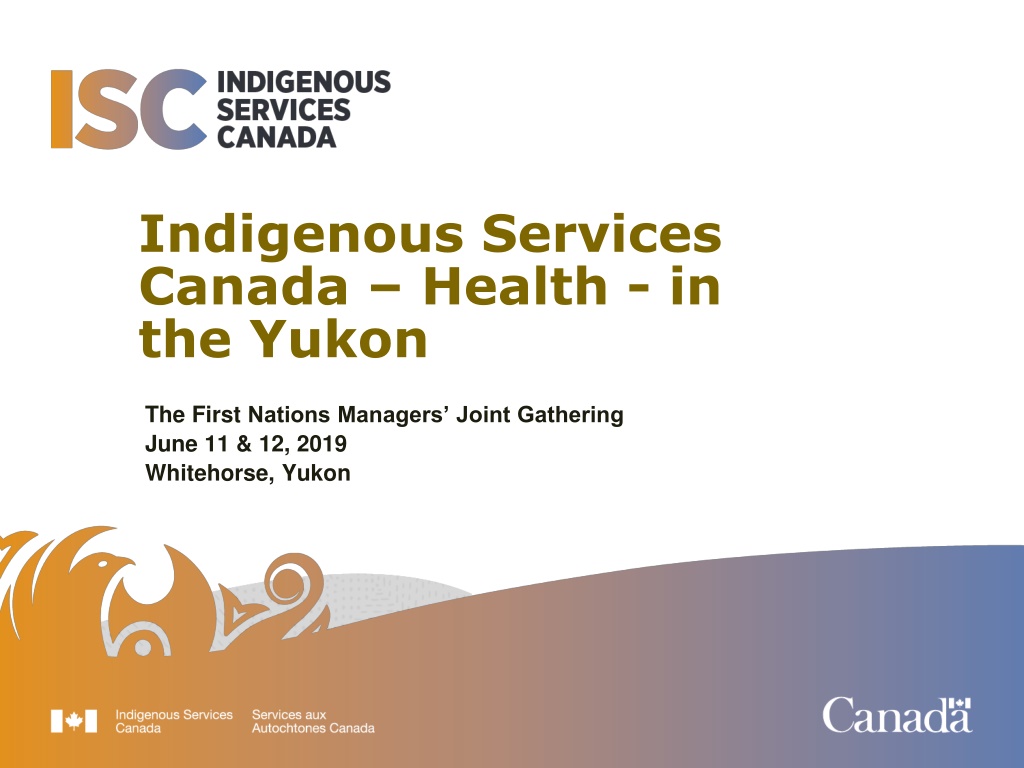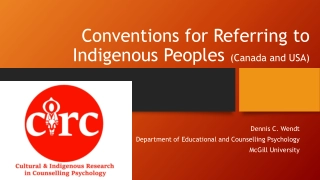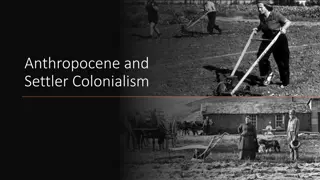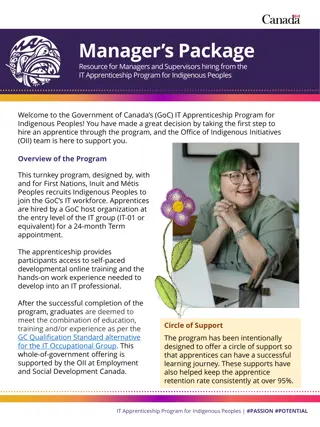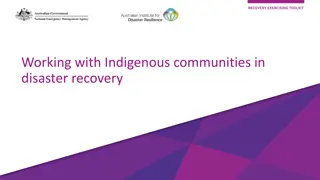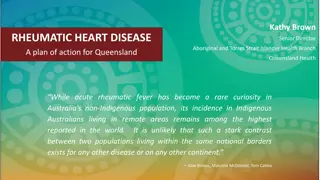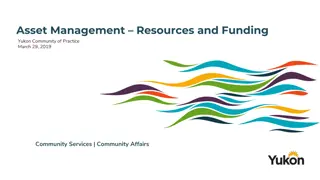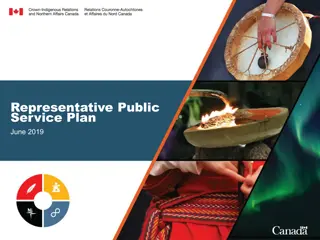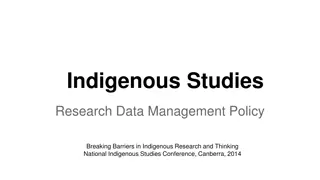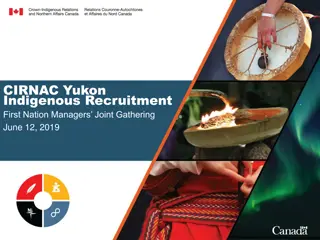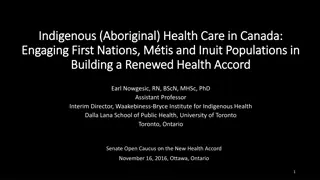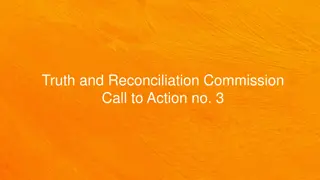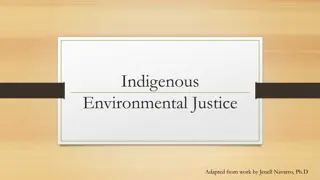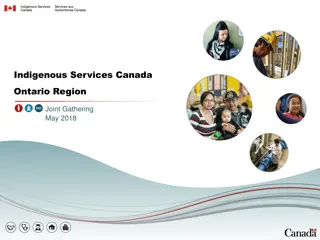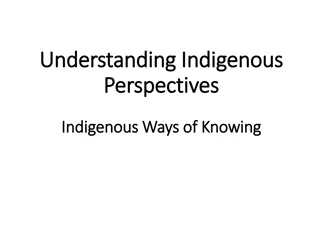Overview of Indigenous Services Canada Health in the Yukon
Indigenous Services Canada Health, Northern Region, plays a vital role in the Yukon by funding health services for First Nations clients, supporting community-based programs, and advocating for territorial partnerships. Their approach involves a paradigm shift towards Northern-specific service delivery models. The organization's structure includes approximately 70 staff in three offices across Ottawa, Whitehorse, and Yellowknife.
Download Presentation

Please find below an Image/Link to download the presentation.
The content on the website is provided AS IS for your information and personal use only. It may not be sold, licensed, or shared on other websites without obtaining consent from the author. Download presentation by click this link. If you encounter any issues during the download, it is possible that the publisher has removed the file from their server.
E N D
Presentation Transcript
Indigenous Services Canada Health - in the Yukon The First Nations Managers Joint Gathering June 11 & 12, 2019 Whitehorse, Yukon
Purpose To provide an overview of the role of Indigenous Services Canada Health, Northern Region, in the Yukon. 2
Role and Mandate ISC-Health takes a health leadership role in the North by acting as a strategic enabler, advocating for territorial partners, and working with other federal departments to support the inclusion of First Nations and Inuit health in national programs, broad Arctic initiatives, and in support of self-government negotiations. Part of this role includes funding health services specifically for First Nations clients. These services are delivered by First Nations partners via contribution agreements and Programs and Services Transfer Agreements (PSTAs) and includes: Community-based health promotion and disease prevention programs; The First Nations and Inuit Home and Community Care program including palliative care; Supplemental health benefits through the Non-Insured Health Benefits Program; and Other time-limited initiatives. ISC-Health also funds other recipients in Yukon, including the Council of Yukon First Nations (CYFN). 3
ISC Approach a Paradigm Shift From To Territorial partners seeking to adapt to south of 60 models Northern-specific service delivery and partnership models Federally-driven process Federal interests defined, but processes developed collaboratively with partners Ad hoc approach to engagement with First Nations, Inuit, and territorial government partners Engagement protocols are operationalized with our partners for ALL areas of operation through trilateral decision making bodies Pan-Aboriginal/pan-territorial approaches Inuit/First Nation-specific and territorial- specific approaches Less support from partners, post- project design Signatories to the agreement after being involved throughout 4
ISC-Health Northern Regions Structure Approximately 70 staff in three offices: Ottawa Office: Regional Executive s Office, Policy, Non-Insured Health Benefits (NIHB), Community-based Programs, Corporate and Financial Services. Whitehorse Office (co-located with the Public Health Agency of Canada): NIHB Medical Travel Call Centre, Indian Residential Schools Resolution Health Support Program (pan-territorial), Dental Clinic and Community-based Programs for Yukon. Yellowknife Office: Community-based Programs for Nunavut and the Northwest Territories, Climate Change and Health Adaptation Program, and Northwest Territories Policy. 5
ISC-Health, Northern Region - Organizational Chart REGIONAL EXECUTIVE Louis Dumulon 613-946-8104 louis.dumulon@canada.ca SENIOR ADVISOR TO REGIONAL EXECUTIVE Sara Taylor 613-410-6604 sara.taylor@canada.ca A/REGIONAL DIRECTOR, POLICY REGIONAL DIRECTOR, OPERATIONS REGIONAL DIRECTOR, CORPORATE COORDINATION Stephanie Dulude 613-957-3406 stephanie.dulude@canada.ca Heather MacPhail 613-946-0909 heather.macphail@canada.ca Annie Berube 613-957-1171 annie.berube3@canada.ca Yellowknife SENIOR MANAGER PROGRAMS Ottawa Whitehorse SENIOR MANAGER Ottawa MANAGER JORDAN S PRINCIPLE REGIONAL DIRECTOR, NIHB Marie Martin 867-393-6770 marie.martin@canada.ca Rachel Levasseur 613-946-6889 rachel.levasseur@canada.ca Sharon Low 867-766-8413 sharon.low@canada.ca Sarah Steeves 613-513-6805 sarah.steeves@canada.ca 6
ISC-Health Program Contacts Indian Residential Schools Resolution Health Support Programs Call Centre: 1-866-509-1769 Contact: Marie Martin, Senior Manager, 1-867-393-6770 Non-Insured Health Benefits Call Centre: 1-866-362-6717 Contact: Rachel Levasseur, Regional Director NIHB, 1-613-946-6889 Jordan s Principle Call Centre: 1-866-848-5846 Contact: Sarah Steeves, Manager, Jordan s Principle, 1-613-513-6805 Email: sac.principedejordanrn-nrjordansprinciple.isc@canada.ca Contribution Agreements Contact: Hazel Buffalo Robe, Senior Program Officer, 1-867-393-6787 7
Partnership Approach in the Yukon ISC-Health works closely with partners to advance shared priorities through participation at the Yukon Health and Social Development Commission. Recently, ISC-Health worked with its Yukon partners to renew the Yukon Trilateral Table on Health, which improves access to health services by providing a forum to discuss and address First Nation priority issues. ISC-Health also works closely with Yukon First Nations who do not have a self-governing agreement to plan priorities for health funding. ISC-Health is seeking to strengthen its partnership footprint by working collaboratively with CIRNAC in order to achieve shared goals. 8
The Yukon First Nations Health and Social Development Commission ISC-Health s Northern Regional Executive is invited to participate in the Yukon First Nations Health and Social Development Commission. ISC- Health works with the Commission to: Advance common health objectives; Discuss new funding opportunities; Address emerging issues; Provide program updates; and Explore potential areas for reform. 9
The Yukon Trilateral Table on Health Membership Includes ISC-Health; The Council of Yukon First Nations; The Yukon Territorial Government; and Three Yukon First Nations (one First Nation without a self-governing agreement, one rural First Nation, and one urban First Nation). Intent of the Table: reduce barriers to accessing services, ensure the provision of high quality services, identify opportunities for joint initiatives, share information, and improve performance measurement. Current Activities Mapping dental and mental wellness services to better understand and address gaps. Coordination of Jordan s Principle services. 10
Transformation Collaboration with CIRNAC: Over the past year, a number of engagement sessions were undertaken to seek feedback on the creation of the two new Departments. Here are some examples of actions already underway: Planning for Common Funding Arrangements between ISC and CIRNAC with all Yukon First Nations without self-governing agreements. The development of new service delivery models including a single- window approach to Jordan s Principle and Children First Initiative in all three territories. Increase employment of Indigenous staff. Bringing together shared ISC and CIRNAC functions. 11
Transformation ISC Strategic Plan As part of creating ISC, a new strategic plan is being drafted based on Transformation engagement conducted across the country since May 2018. The intent of the strategic plan is to provide direction for the department and clearly outline how ISC will work to support partners. ISC presented an outline of the Strategic Plan and its priorities at the Yukon Health and Social Development Commission. Engagement will be ongoing throughout the development of the plan. 12
ISC Strategic Plan: Values and Mandate Values: Humility: We acknowledge that we have personal and organizational limitations. We admit what we do not know. We seek to learn and grow from our interactions with others and build self-awareness. We defer to Indigenous Peoples as the experts on their interests and trust in their solutions. Kindness: We conduct ourselves with respect, caring and courtesy at all times. We are tough on issues and easy on each other. We are mindful of our personal health, for to serve others, we must care for ourselves. Empathy: We understand that the past informs the present. We recognize the deep and complex impacts of colonialism. We are committed to honouring the history of Canada as it relates to Indigenous Peoples and applying this knowledge to our context and our relationships. Trust: We work to eliminate barriers, to create conditions of equal opportunity. We live up to our commitments, take ownerships of our mistakes, and are answerable to Indigenous Peoples for our actions and decisions. Excellence: We are honoured to serve Indigenous Peoples and have a moral and personal responsibility to strive for excellence in our work. Mandate: ISC will improve access to high-quality services with First Nations, Inuit and M tis people, support work to improve well-being in Indigenous communities across Canada and empower Indigenous Peoples to control the delivery of services. Indigenous partners will set the pace and decide the ways in which they will assume control over services. 13
ISC Strategic Plan: Priorities Priority 1: Return Control and Jurisdiction to Indigenous Peoples Recognize and support inherent self-determination with flexible approaches that are responsive to the distinctiveness of indigenous nations and peoples. Priority 2: Building a Service Ethic Services are provided with care, fairness, respect and transparency and guided by Indigenous Peoples. The services provided are culturally appropriate, high-quality, and responsive. Priority 3: Organizing Ourselves to Deliver Access to services is simple, seamless across jurisdictions, and structured from the recipients points of view, not the provider. Priority 4: Mobilizing a Representative, Culturally Competent, and Healthy Workforce We are committed to: a culturally-safe workplace and culturally-competent workforce; wellness and work-life balance; and, recruiting, retaining, and advancing Indigenous employees. Indigenous ways of knowing and doing inform how we treat ourselves and each other. 14
Questions / Comments? For additional information, please contact: Louis Dumulon, Regional Executive Northern Region First Nations and Inuit Health, Indigenous Services Canada Tel: 613-946-8104 louis.dumulon@canada.ca 15
